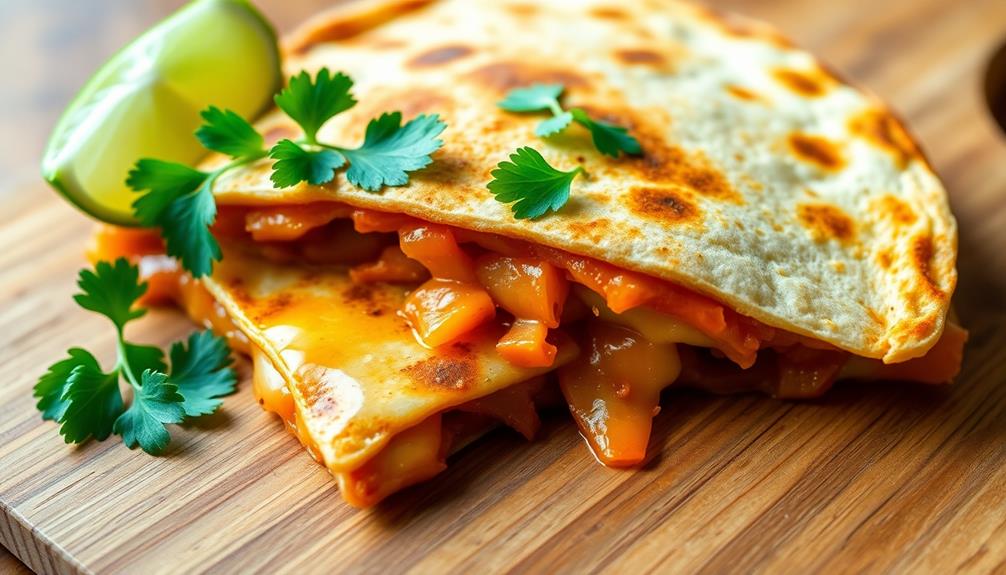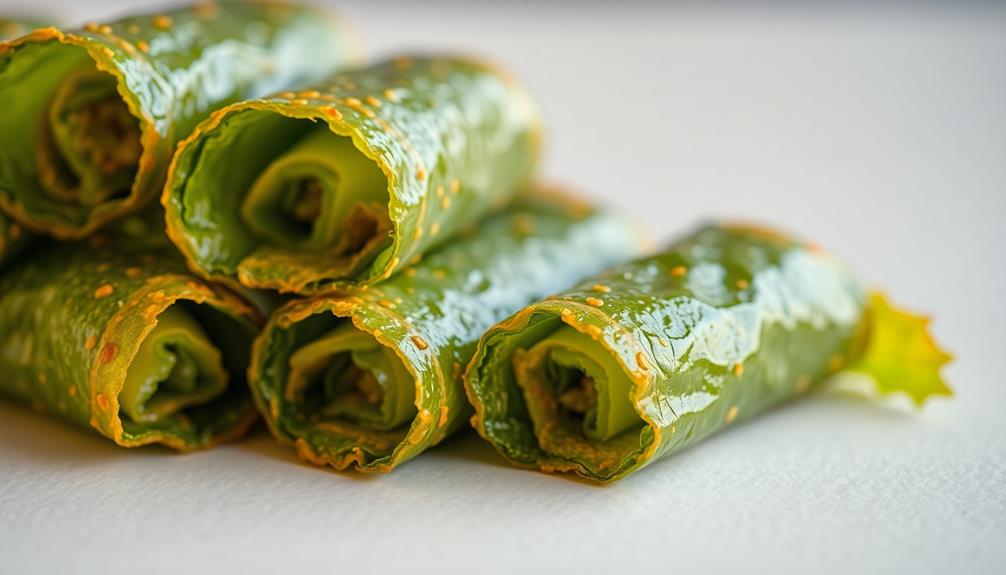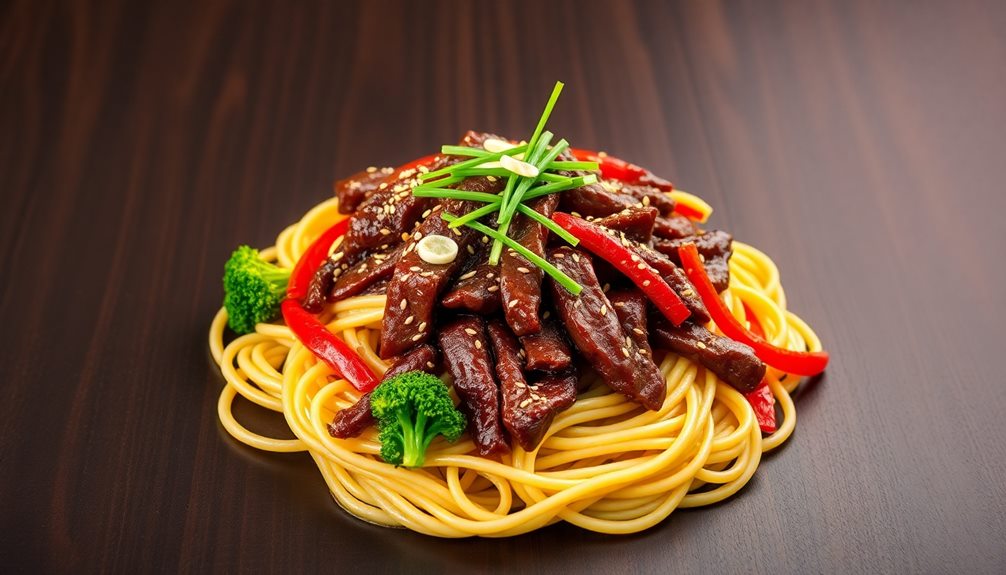Kimchi Quesadillas are a mouthwatering fusion of Korean and Mexican cuisines! You'll love the bold, tangy flavor of kimchi blended with the warm, melty comfort of a classic quesadilla. This dish adds a spicy, crunchy twist to an old favorite, making it perfect for quick weeknight dinners or sharing with friends. It's easy to customize to your tastes, so everyone can enjoy the unique flavors. Once you try this creative combination, you'll be hooked! Let's dive in and explore the cultural history and cooking steps behind this delectable dish.
Key Takeaways
- Kimchi Quesadillas blend the bold, tangy flavors of Korean kimchi with the comforting warmth of Mexican quesadillas, creating a unique culinary fusion.
- The dish showcases the impact of globalization on food, as traditional cuisines collaborate to produce innovative and delicious dishes.
- Kimchi Quesadillas are customizable, allowing for individual preferences and encouraging experimentation with bold flavor combinations.
- Preparing Kimchi Quesadillas involves simple steps, making it a quick and easy option for weeknight dinners or gatherings.
- The harmonious blend of flavors, textures, and colors in Kimchi Quesadillas provides a delightful taste journey for the senses.
History
Originating in Korea, kimchi has long been a staple of the country's cuisine, its pungent flavors and crunchy texture captivating taste buds for centuries.
This fermented cabbage dish has become a beloved part of Korean culture, with recipes passed down through generations. While kimchi is traditionally enjoyed on its own, it's now finding its way into all sorts of creative dishes, including the mouthwatering Kimchi Quesadillas.
These fusion treats blend the bold, tangy notes of kimchi with the warm, melty comfort of a quesadilla.
It's a match made in culinary heaven, bringing together the best of Korean and Mexican flavors. The crunchy, spicy kimchi perfectly complements the gooey cheese, creating a symphony of textures and tastes in every bite. This fusion dish not only satisfies cravings but also sparks curiosity about global cuisines and their unique twists. It’s a playful reminder of how food can be a bridge between cultures, much like the ongoing debates about Korean ramen vs Japanese ramen—where bold spice meets umami depth. Together, these contrasting yet harmonious elements create a dining experience that’s both comforting and adventurous.
Whether you're a fan of Korean cuisine or simply love trying new and exciting flavor combinations, Kimchi Quesadillas are sure to delight your palate and leave you craving more.
Recipe
Kimchi, the spicy and fermented Korean side dish, can be a delightful addition to classic Mexican quesadillas. The tangy, crunchy texture of kimchi pairs surprisingly well with the melted cheese and warm tortilla. This fusion dish is a fun way to explore the versatility of kimchi and create a unique and flavorful meal.
Quesadillas are a quick and easy option for a weeknight dinner or a casual gathering with friends. The combination of kimchi and cheese makes for a satisfying and crowd-pleasing dish that can be customized to individual tastes.
- 2 cups shredded cheddar or Monterey Jack cheese
- 1 cup drained and chopped kimchi
- 8 (8-inch) flour tortillas
- 2 tablespoons butter or olive oil
In a large skillet or griddle over medium heat, place one tortilla and top with a quarter of the cheese and kimchi. Top with another tortilla and cook for 2-3 minutes per side, or until the cheese is melted and the tortilla is lightly browned.
Repeat with the remaining ingredients to make 4 quesadillas.
For best results, be sure to drain the kimchi well before adding it to the quesadillas. This will prevent the tortillas from becoming soggy.
Serve the kimchi quesadillas immediately, with any desired dipping sauces or toppings such as sour cream, salsa, or chopped scallions.
Cooking Steps
Warm up the tortillas on medium heat.
Once they're nice and toasty, add a generous helping of that tasty kimchi right onto the tortilla.
Sprinkle the shredded cheese evenly over the top, fold the quesadilla in half, and cook it until it's golden and delicious.
Cut it up and get ready to dig in!
Step 1. Warm Tortillas on Medium Heat
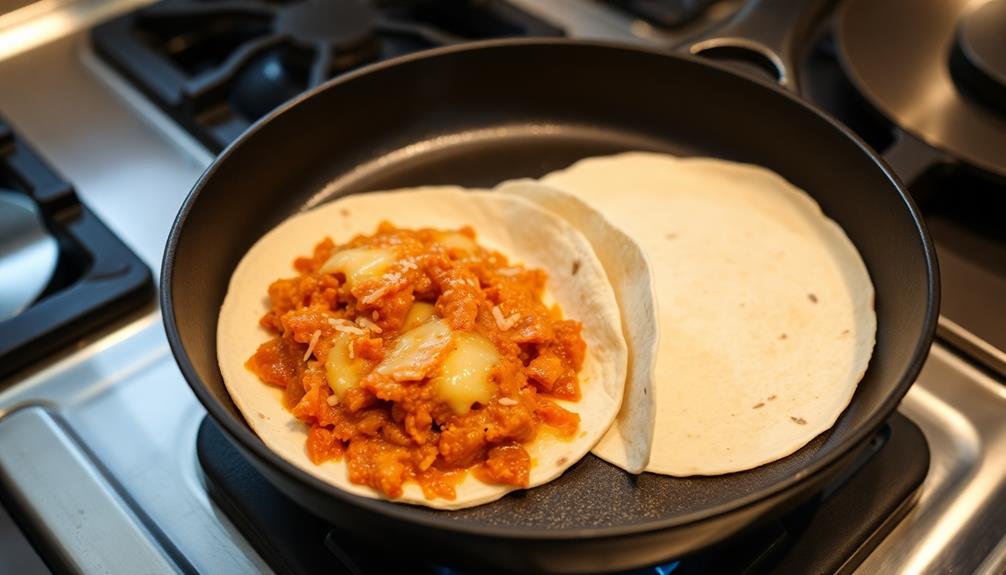
Preheat a large skillet over medium heat.
You'll want to warm up the tortillas before assembling your quesadillas. Place a tortilla in the hot skillet and let it sizzle for about 30 seconds. Flip it over and warm the other side for another 30 seconds. The tortilla should be slightly pliable and lightly toasted when you're done.
Repeat this process with the remaining tortillas, stacking them on a plate as you go. Be sure to keep the heat at medium – you don't want the tortillas to burn.
Toasting them gently helps create the perfect texture for your quesadillas. Once all the tortillas are warmed, you can start building your Korean-Mexican fusion masterpieces!
The soft, pliable tortillas will be ready to fold around the flavorful kimchi and melty cheese. Get ready for an explosion of delicious flavors in every bite.
Step 2. Add Kimchi to Tortilla
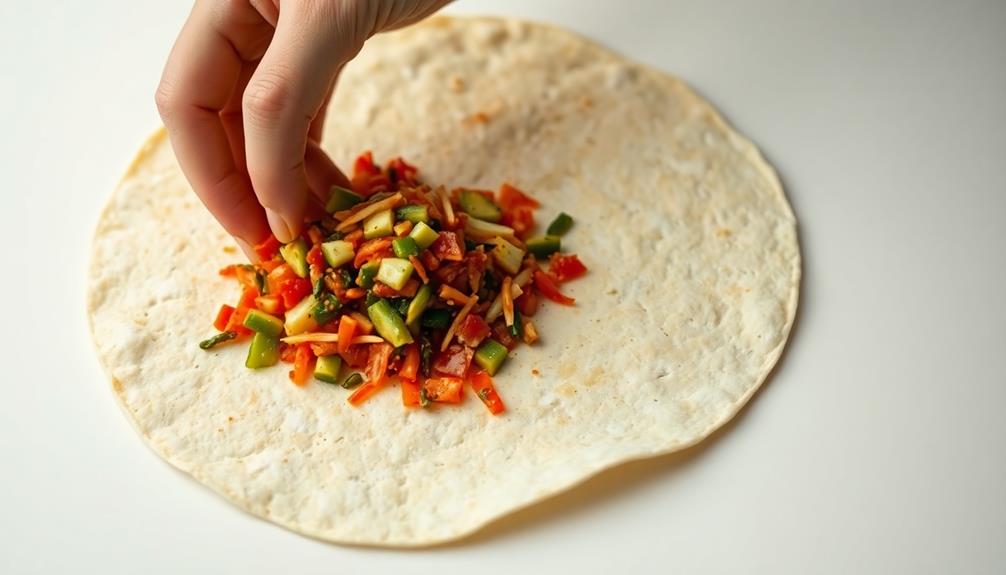
With your tortillas warmed and ready, start building your kimchi quesadillas. Take a generous spoonful of that tangy, spicy, and crunchy kimchi and place it onto one half of the tortilla. Spread it out evenly, leaving a bit of room around the edges.
Now, it's time to add the cheese. Sprinkle a handful of shredded mozzarella or cheddar over the kimchi, making sure to cover the entire surface. Fold the other half of the tortilla over the filling, creating a perfect half-moon shape.
Place your quesadilla in a large skillet or griddle set to medium heat. Cook for 2-3 minutes per side, or until the tortilla is golden brown and the cheese is melted and gooey. Be gentle when flipping to keep the quesadilla intact.
Once both sides are nicely toasted, remove it from the heat and slice it into wedges. Serve your delightful kimchi quesadilla hot, with a side of your favorite dipping sauce for an extra flavor boost.
Step 3. Sprinkle Shredded Cheese Evenly
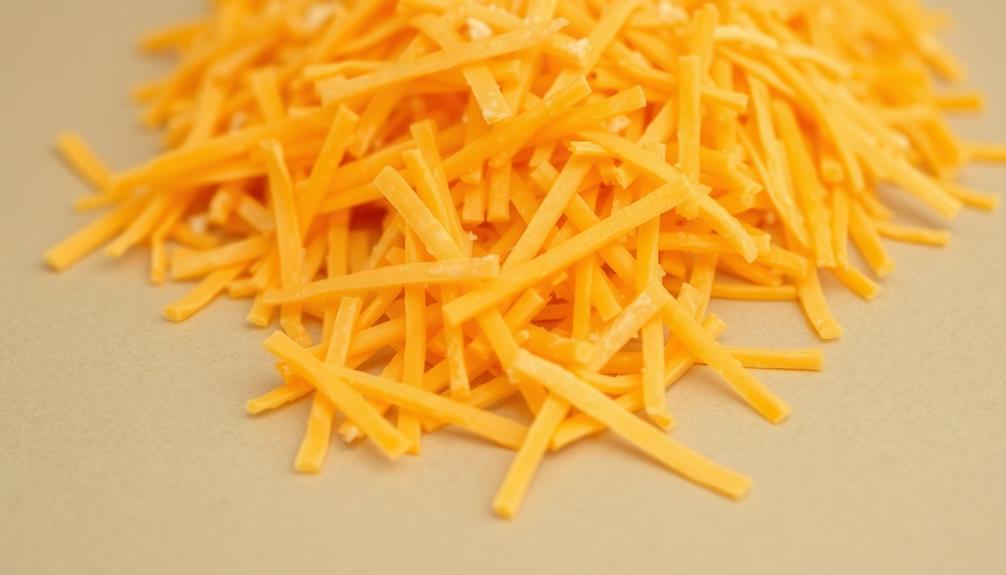
Sprinkle a handful of shredded mozzarella or cheddar evenly over the kimchi, ensuring the entire surface is covered. You want every bite to have that gooey, melty cheese goodness.
Gently press the cheese down so it adheres to the kimchi. This will help the quesadilla hold together when you fold it.
Next, take another tortilla and place it on top, pressing down lightly to create a sandwich. Your kimchi quesadilla is now ready to be cooked!
Heat a skillet or griddle over medium heat and carefully transfer the quesadilla to the hot surface. Cook for 2-3 minutes per side, or until the tortilla is golden brown and the cheese is melted.
Keep an eye on it, and flip the quesadilla gently using a spatula. You want both sides to be evenly toasted and the cheese to be melted throughout.
Once it's perfectly crispy, remove the quesadilla from the heat and slice it into wedges. Enjoy this delicious fusion of Korean and Mexican flavors!
Step 4. Fold Quesadilla, Cook Until Golden
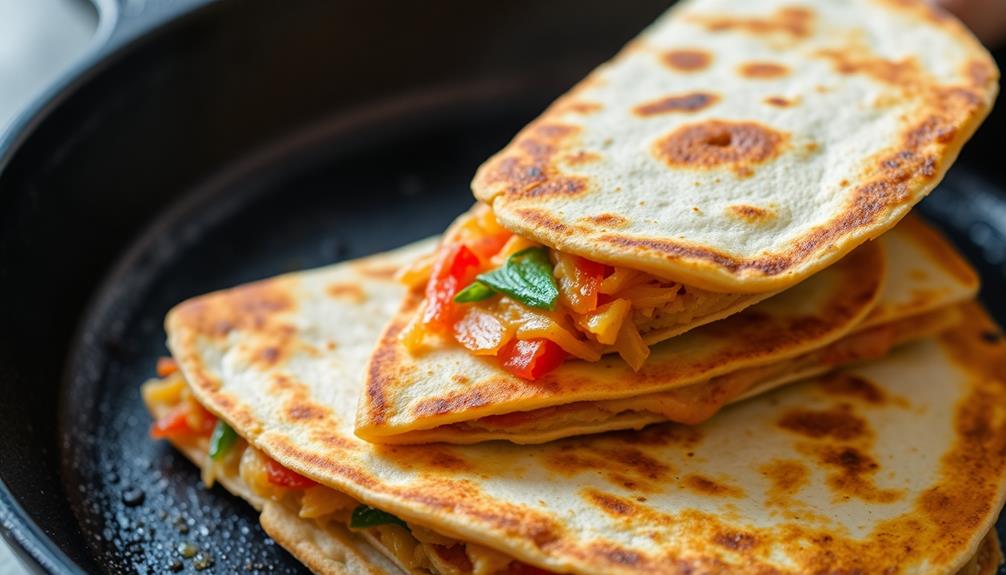
Once the cheese is evenly dispersed, take the remaining tortilla and place it atop the kimchi-cheese layer, gently pressing down to create a sandwich.
Now, it's time to fold the quesadilla. Grab the edges of the top tortilla and carefully fold it in half, sealing the kimchi-cheese goodness inside. This folding technique helps the quesadilla hold its shape as it cooks.
Next, heat a large skillet or griddle over medium heat. Once the surface is nice and hot, gently place the folded quesadilla into the pan.
Let it cook for 2-3 minutes, or until the bottom is golden brown and crispy. Use a spatula to flip the quesadilla over and cook the other side for another 2-3 minutes.
Keep an eye on it, as you want both sides to be evenly toasted and the cheese melted throughout.
Step 5. Cut Quesadilla and Serve
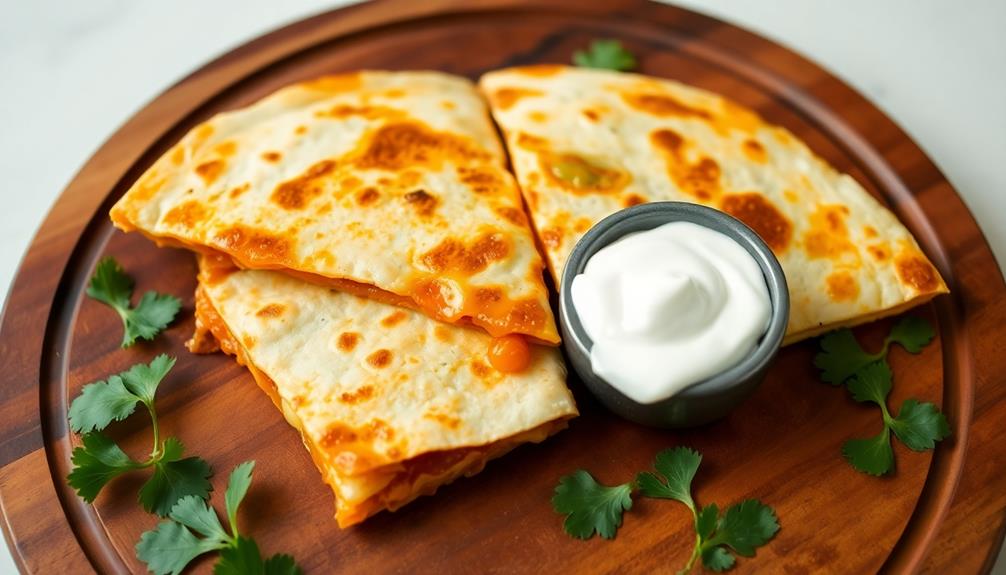
Once the quesadilla is golden brown and the cheese is melted, it's time to cut and serve. Using a sharp knife, carefully slice the quesadilla into wedges or triangles. This will make it easy to grab and enjoy.
Be sure to use caution, as the quesadilla will be hot right off the skillet. Slowly and steadily, cut through the crunchy exterior and the gooey, melted interior. As you make each slice, the aroma of the toasted tortilla, the savory kimchi, and the melted cheese will fill the air.
Once it's cut, arrange the quesadilla wedges on a plate or platter. You can serve it as is, or add a dollop of sour cream, a sprinkle of chopped green onions, or a drizzle of your favorite hot sauce for extra flavor.
The vibrant colors and textures of the quesadilla will make it a true feast for the senses. Dig in and savor the delightful fusion of Korean and Mexican cuisines in every bite!
Final Thoughts
As you savor the final bites of your Kimchi Quesadillas, you can't help but be struck by the harmonious blend of flavors that have danced across your palate.
The crisp, golden-brown exterior of the quesadilla gives way to a symphony of textures and tastes. The tangy, fermented bite of the kimchi perfectly complements the melted, gooey cheese, creating a harmonious fusion that lingers on your tongue.
With each crunchy bite, you're transported to the vibrant streets of Seoul and the bustling cantinas of Mexico, where cultures collide to create something truly special.
It's a culinary adventure that celebrates the art of blending the unexpected. As you savor the final moments, you can't help but feel a sense of satisfaction, knowing that you've experienced a truly unique and delightful creation.
The Kimchi Quesadilla has proven that the possibilities for culinary innovation are endless when we embrace the spirit of cultural exchange and bold experimentation.
Frequently Asked Questions
What Makes Kimchi Quesadillas a Unique Fusion Dish?
Kimchi quesadillas are a unique fusion dish because they combine the spicy, fermented flavors of Korean kimchi with the cheesy, grilled goodness of a classic Mexican quesadilla. The contrast of these two distinct cuisines creates a truly one-of-a-kind culinary experience.
Can I Substitute Regular Kimchi for the Recipe?
You can substitute regular kimchi for the recipe, but it won't have the same flavor profile. The combination of the spicy, fermented kimchi and the melted cheese creates a unique fusion that regular kimchi may not capture.
How Long Do the Quesadillas Take to Prepare?
The quesadillas should take you around 15-20 minutes to prepare. This includes assembling the ingredients and cooking the quesadillas on the stovetop until they're golden brown and the cheese has melted. It's a quick and easy dish to make.
Can I Make the Quesadillas Ahead of Time?
You can absolutely make the quesadillas ahead of time. Just assemble them, then simply reheat in the oven or on the stovetop when you're ready to serve. This allows you to prepare them in advance for convenience.
Are There Any Vegetarian or Vegan Variations of the Dish?
You can definitely create vegetarian or vegan variations of this dish. Simply swap out the traditional fillings with your preferred plant-based ingredients like tofu, mushrooms, or a blend of roasted veggies for a delicious meatless option.
